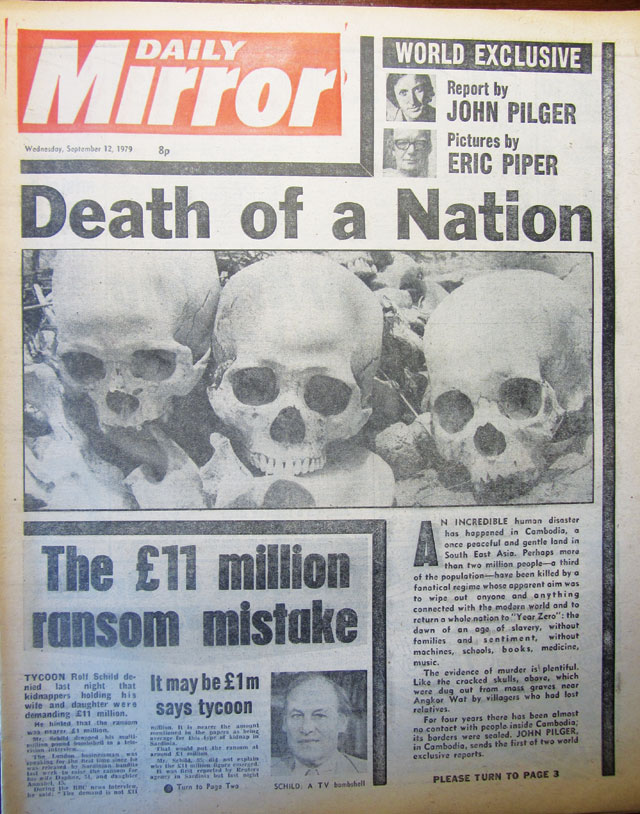How do you remember your days spent in Cambodia while working on the Year Zero documentary?
I remember 1979 as one of the most extraordinary years of my life. Nothing prepared me for what I saw in Cambodia: the suffering and trauma. Added to this was the vivid evidence of how great power works. Cambodia had been liberated by the Vietnamese, who less than three years earlier had expelled the Americans from their own country. In revenge, Washington imposed a complete embargo on both Vietnam and stricken Cambodia in the wake of the overthrow of Pol Pot – while continuing to back the defunct Khmer Rouge regime in the UN. It is difficult for us to contemplate such cynicism. Much of the West went along with this, notably Margaret Thatcher’s Britain.
When I arrived in Phnom Penh, I found no substantial aid reaching people who then needed it more urgently than perhaps any society on earth. Phnom Penh was still partly a ghost city, populated, it seemed, by malnourished, orphaned children. The only substantial aid came from impoverished, war-scarred Vietnam. One of my dispatches occupied almost an entire issue of the Daily Mirror – which sold out. The public’s response was remarkable. Unsolicited, millions of pounds arrived from ordinary British people; this was repeated in many countries where the film was broadcast – from Europe to Australia. The film raised some $50 million, a huge amount back then. With Oxfam’s help, emergency flights with medicines and milk for children began to arrive. We built a factory that produced coloured clothes for people yearning to get rid of the Khmer Rouge black uniform.
What are your thoughts on Cambodia’s recent efforts for justice?
Of course, I shared the relief of survivors that some of those responsible for the genocide had been brought to justice. The Khmer Rouge nightmare was only part of the story. There is little doubt that the carpet-bombing of Cambodia by the US – ordered by President Nixon and Henry Kissinger – was the catalyst that empowered and brought to power a relatively small revolutionary sect. The bombing was a gift to Pol Pot – the horror that Nixon and Kissinger began, the Khmer Rouge finished.

What is your view of Southeast Asia’s development in the 21st Century?
Southeast Asia has made outstanding progress in the provision of real prosperity for some of its people. In some countries, it’s a real post-colonial success story. That said, familiar, corrupt elites still hold sway over millions of lives. My own view is that only when countries throw off this control by the few, along with an imperial influence that persists in different forms, will people begin to be truly free.
To what extent are we living in an Orwellian society?
We live in an Orwellian society – as Edward Snowden has demonstrated. Governments and powerful vested interests use Orwellian doublespeak to confuse us and appropriate formerly noble words such as “democracy”. The media, with its interwoven corporate agendas, plays a critical role. Much of so-called mainstream news is either unwatchable or unreadable; it expresses the designs of power with the same old clichés, the same false assumptions, and the same old censorship by omission. A lot of the time it turns truth on its head, as in the current, dangerous propaganda campaign against Russia. As Orwell predicted, news has become like a version of so-called reality TV – even the word “reality” has lost its meaning.
What advice would you give to a young journalist just beginning their career?
Stay independent of mind even if you work within a system. Learn to navigate through organisations without surrendering your youthful ideals. Always be sceptical of the declarations of those in power and authority, especially when there is no accountability. Understand that the basic morality that ordinary people exercise in their own lives is not reflected by power. In other words, always look for the truth from the ground up, rarely from the top down. Journalists are never real journalists if they are the agents of power, no matter how they disguise that role. Real journalists are agents of people.

